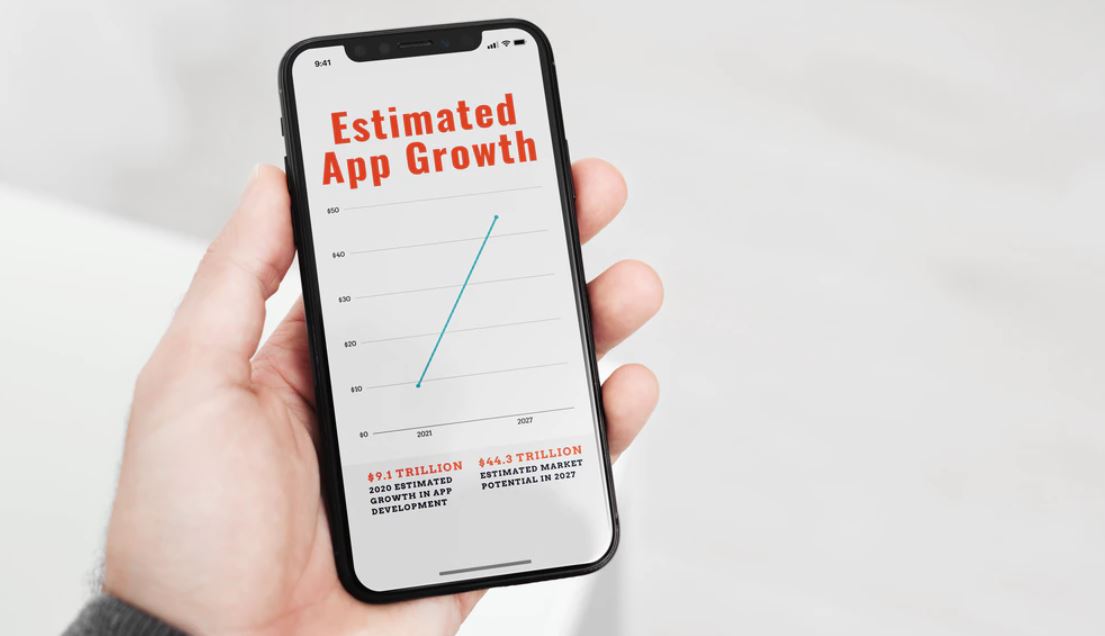How to grow your small business with a mobile app

You may have wondered if apps for small businesses are a good investment.
However, any marketer worth their salt knows the best way to reach customers is to be present wherever your customers frequent.
And more and more often, consumers are on their mobile devices.
A recent study by TechCrunch revealed that U.S. consumers spend 5 hours per day on their mobile devices.
Additionally, consumers spend more time on mobile apps than they do watching TV.
Business Wire even predicts that the global mobile app development market will reach a value of $44.3 trillion by 2027.
This makes it absolutely essential for small business owners to have their own app; the sooner, the better.
So, if you want to reach your customers where they already are, here’s how a mobile app will help you grow your small business in 2022.
How to grow your small business with mobile development in 2022:
When thinking about how to grow a small business, consider this: a mobile app can help you reach more customers, drive repeat sales, increase referrals, and more.
So if you’re ready to level up this year, you may want to incorporate these strategies into your marketing plan.
1. Reach more customers through Google Play Store & Apple Store
In an analysis on mobile marketing, SEO and marketing expert Neil Patel cited that adults spend 86% of their mobile time on apps.
So, if the average consumer spends 5 hours a day on their phone, that means nearly 4.5 of those hours spent using mobile apps.
Enter the Google Play Store and Apple Store.
Mobile app stores can get your brand in front of the people who need your services, when they need them. Any time a user searches for something related to your app, they will find you.
In 2020, the Google Play Store and iOS Store combined produced $111 BIL in worldwide revenue, according to a report by Business Of Apps. This is a 24% increase from the previous year.
Mobile app stores are growing, and small business owners are becoming savvy to the benefits of having an app.
A 2021 study by Statistia discovered that 42% of small businesses already have a mobile app.
Don’t be left behind by your competition: incorporate a mobile app into your strategy ASAP.
2. Push notifications are proven to significantly increase sales for small businesses
If you are one of the 294 million Americans who use a mobile device, you understand how easily push notifications can get a user’s attention.
Of course, it’s also easy to dismiss push notifications. But one thing is for sure: businesses see a dramatic increase in conversions when they switch to push notifications for mobile devices.
In fact, marketing and SEO expert, Neil Patel, reports that push notifications brought more than 231,000 visitors to his website.
Perhaps that’s because push notifications keep your content more accessible and help you stay top-of-mind more often.
In a case study by Apps Tango, healthcare brand Docs Ink was able to scale their business after implementing a mobile app. This is because the app enabled them to provide more effective patient care with one-click telehealth and remote patient monitoring.
Automatic notifications also help business owners increase brand loyalty. This can be achieved in many of the following ways:
-
provide more high-value content, more often;
-
keep app users accountable (particularly useful for learning-based apps);
-
stay on track with personal goals;
-
build a community of like-minded users to enhance their overall experience with your brand.
Push notifications are even applicable to website app development. Though users are turning to mobile more and more often, desktop notifications still drive website traffic, too. How would your business change in 2022 if you could automate website traffic?
3. Apps help you streamline sales, contracts, service visit, referrals and more
Maximize your efforts and eliminate time consuming aspects of doing business, like paper, follow-up phone calls, and scheduling. All of this can be automated!
Whether you’re looking into iOS app development, Android app development, or both, it’s worth thinking about how an app can change your business.
And it won’t just change how you operate. Automation can have lasting results on your ROI.
According to a case study by Apps Tango, when sales giant Aptive started using a mobile app to automate sales and service visits, they began a 5-year streak of record-breaking sales.
Now, Aptive is able to make business decisions based on real-time mobile data. They’ve taken the guesswork out of their operations and have saved valuable time for sales reps, who have leveraged the extra time to increase sales.
Not only do apps increase efficiency, but they can even help increase client referrals.
Using an in-app referral program makes it fast and easy for customers to share referral codes. With the click of a button, they can invite friends and track the rewards they’ve earned. This makes it much more likely that customers will make referrals.
FAQs About Mobile Apps for Businesses:
How much does app development cost?
When it comes to iOS or android app development cost, you might be pleasantly surprised. Mobile app development doesn’t always cost as much as you think it might.
And when you weigh the dramatic increase in sales you can make against the app development cost, it’s easy to see how worthwhile it is.
How do I find the best app developer for my small business?
Make sure you’re working with a top mobile app development company by screening the company beforehand. The top app developers will even help with your app store release; to ensure you’re getting the best bang for your buck, make sure you work with a company that does this.
Read the original article from the Salt Lake Tribune here.




